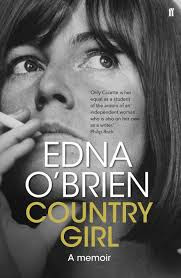Tuesday, July 2, 2013
THE HEART OF WRITING
COUNTRY GIRL, Edna O’Brien’s memoirs is a book of exquisite beauty. The prologue alone is jewel that shines so softly one regrets time spent reading gaudier works. There immense emotional restraint in O’Brien’s account her visit to a National Health clinic where a nurse checked her hearing before she delivered this bombshell,
“You are quite well, but with regard to your hearing, you are a broken piano.”
O’Brien’s second paragraph is one of the most poignant I have ever read, “At home the garden was waiting, the second flowering of the roses, washed pink and blousy, but beautiful, and the leaves on the fig trees were a ripple as birds darting in and out, chasing each other, half in courtship and half in combat.” Everything a writer needs to know about graceful transition, vivid imagery, muted sadness and a fierce determination to go on is there.No self-pity, no appeal for sympathy, no literary pony tricks. Just this virtuoso arrangement of words that go straight to reader’s heart.
Verbal virtuosity is an Irish gift, so say the Irish. If that is so, this gift is one that brought O’Brien great joy and great sorrow. She was in her mid-twenties,a mother of two, married to the writer Ernest Gebler, when she wrote THE COUNTRY GIRLS, the first of her twenty-one novels. “The words tumbled out, like the oats that on threshing day tumble-down the shaft, the hard pellets of oats funneled into bags and the chaff flying everywhere, getting into the men’s eyes and their having to shout to be heard above the noise.” It took her three weeks to complete that work, which brought her instant acclaim. Gebler, whose bestselling THE PLYMOUTH ADVENTURE: THE VOYAGE OF THE MAYFLOWER had been made into a movie, grew resentful of her success. after he read her manuscript, “…he said something that was the death knell of the already ailing marriage–’You can write and I will never forgive you.’” Gebler could not accept that the young woman he “lifted…from behind a shop counter…launching (her) into a world of literature and refinement…Though void of intellect and or cognitive powers (she)was already passing herself off as a writer.”
In fact, O’Brien had been writing all her life although when she and Gebler met, she was working at a pharmacy, “…training for a profession that was not my chosen one but convinced that I would meet poets and one day I would be admitted into the world of letters.” Ireland was no promised land for a woman of literary aspirations and then as now, a writer is someone whose work has been published. As it often happens to the published of women trapped in the pink ghetto of the print media, O’Brien’s lifestyle column for a railway magazine, was easy to dismiss. “With no time to walk the city or interview people, my topics tended to be somewhat generalized and ranged from the joys of golden autumn evenings to culinary skills for tossing a Shrove Tuesday pancake…” She adds, ruefully, “It was a long way from James Joyce.” Nevertheless the column led to newspaper articles,the first of which almost ran under the wrong byline, “My pride in having it accepted was very great, knowing that people at home would read it and my mother might forgive me my literary aspirations…..I had gone to collect the guinea due to me …There, to my delight was the warm sheet of newspaper…but my instead of my name, it was my sister’s.”
There is so much to recommend this book, that I, who love memoirs, who list Nabokov’s SPEAK MEMORY among the books I would pull out of a burning house, find myself nearly speechless.I want to say that I know of no portraits more sensitively painted that of Carnero’s, the illiterate farm hand who taught O’Brien that men can be loving. I want to talk to say that she recounts her harrowing flight from her despicable husband with the same restraint she talks of the dreadful news she received at the Health Clinic. I want to say that the prologue of her memoirs is one of the most moving I have ever read and I have been read for well over sixty years. Most beautiful, best,lyrical, flawless, touching are the words that come to mind, but they can never match the power of this book. A master of ambience, a wizard of situations, a teller of enchanting stories also fall short of describing O’Brien as she is in this book–a woman who, upon finding out that she is going deaf, who recollects all that writing has brought her–fame, money, the friendship of women such as Jacqueline Kennedy and Hillary Clinton, as well as barbed criticism. She catalogs some of the hurtful labels applied to her throughout her career, “Bargain basement Molly Bloom…Barbara Cartland of long-distance Republicanism…. past her sell-by date as a writer” are among the insults she remembers. No matter. She lists them, then takes out a cookbook, bakes a batch of soda bread and starts writing her memoirs.
O’Brien became a writer despite her mother’s opposition, her husband’s cruelty, her fellow citizens’ harsh criticism. She wrote despite being an Irish Catholic woman schooled to do as she was told. She also wrote because few women in the world can match the primeval strength of an Irishwoman with a cause. Once she heard a man recited, upon seeing Maude Gonne on the streets of Dublin, the words Yeats had written for her,
“A crowd
Will gather and not know it walks the very street
Whereon a thing once walked that seemed a burning cloud.”
It seems typical of O’Brien not notice that the does not notice that can be said of her,
Subscribe to:
Post Comments (Atom)

No comments:
Post a Comment